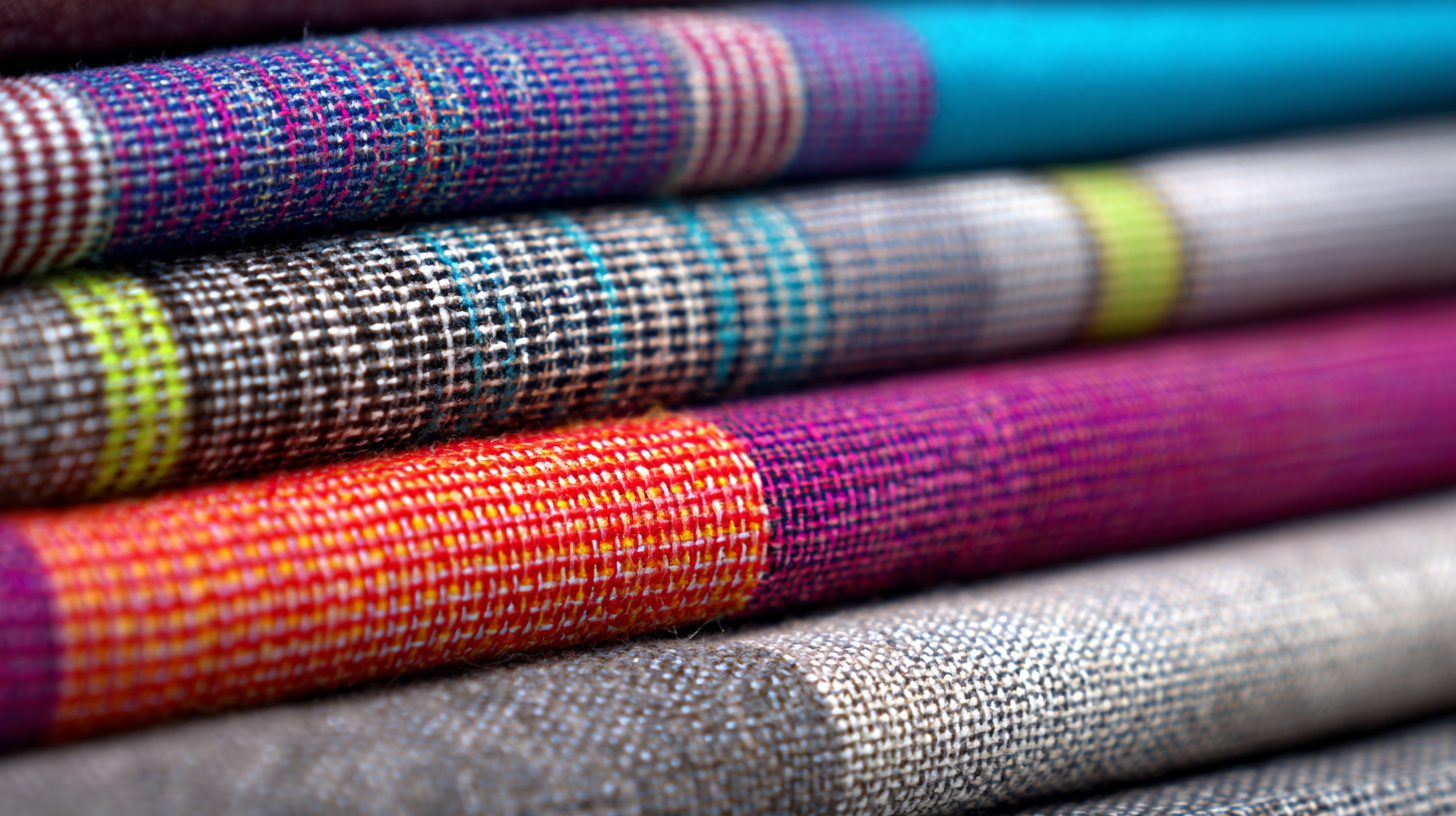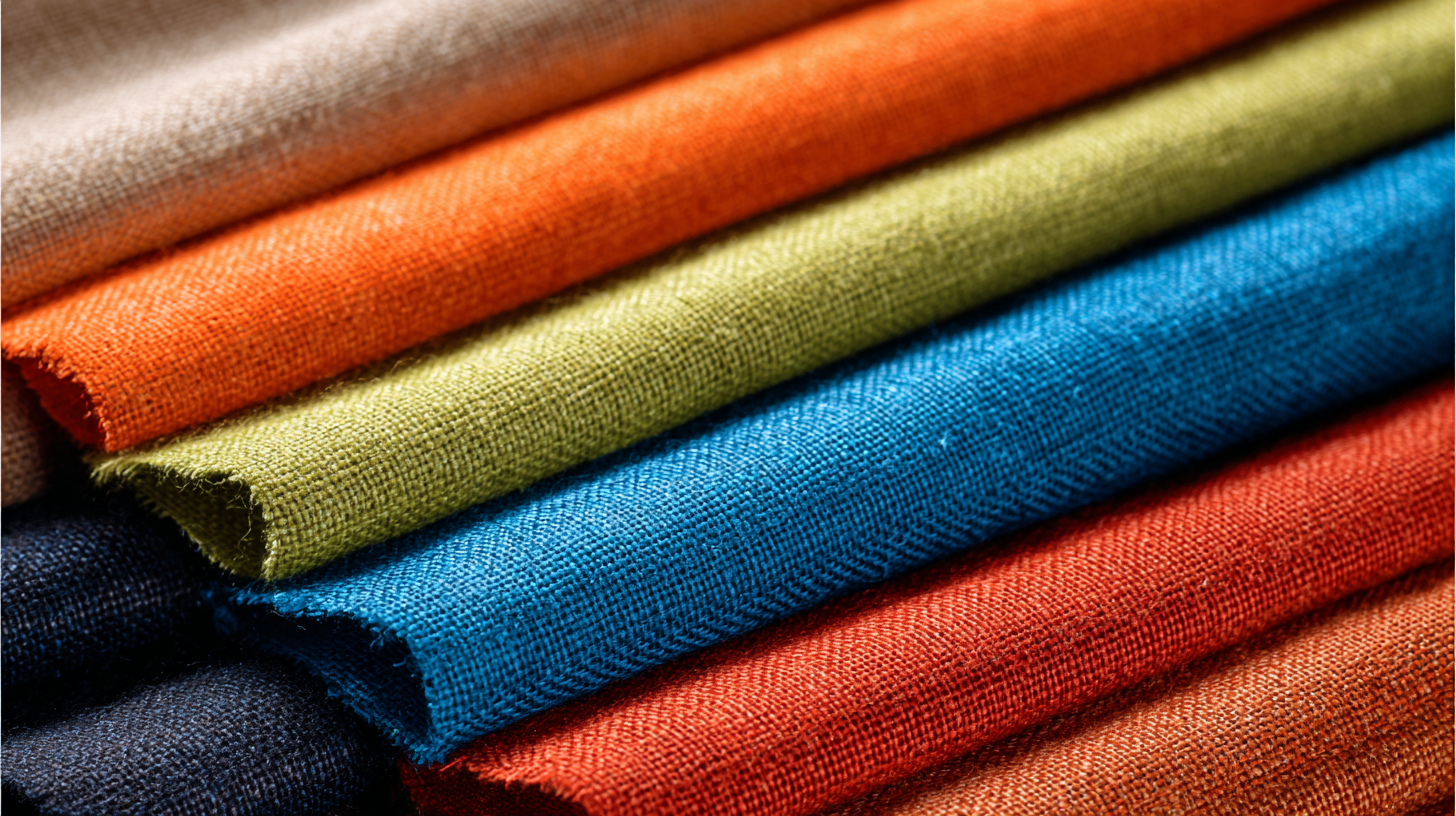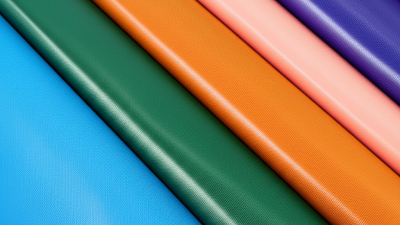In recent years, the demand for Polyester Woven fabrics has surged, attributed to their durability, versatility, and cost-effectiveness. According to a report by Research and Markets, the global market for polyester woven fabrics is expected to reach $72 billion by 2025, driven by the rising use of these materials in various industries including fashion, home textiles, and automotive applications. As we delve into the top five benefits of Polyester Woven fabrics, it's essential to note how they have become a staple in both domestic and industrial settings.

Industry expert Dr. Emily Carter, a leading textile researcher, emphasizes the significance of these fabrics in modern manufacturing. She states, "Polyester Woven fabrics not only offer exceptional strength and resilience, but they also provide a sustainable alternative by being recyclable and environmentally friendly." This dual advantage positions them as a critical element in the ongoing conversation about sustainable textiles. Through understanding their unique properties and applications, we can appreciate why Polyester Woven fabrics are a top choice for consumers and manufacturers alike.
Polyester woven fabrics have rapidly gained recognition in modern textile applications due to their numerous advantages. One of the primary benefits is their exceptional durability. Unlike other materials, polyester is resistant to shrinking, stretching, and wrinkling, making it an ideal choice for garments that undergo frequent washing and wearing. This resilience ensures that products maintain their appearance and structure over time, offering excellent value for consumers.

Another significant advantage of polyester woven fabrics is their versatility. They can be engineered to mimic the look and feel of natural fibers, while also providing superior moisture-wicking properties. This makes polyester fabrics suitable for a wide range of uses, from sportswear and outdoor gear to home furnishings. Additionally, the ease of dyeing polyester allows for vibrant colors and patterns, catering to various aesthetic preferences in the fashion industry. As eco-friendly practices become increasingly important, advancements in polyester recycling further enhance its appeal, promoting sustainability in textile production.
When it comes to choosing fabrics for durability and longevity, polyester woven fabrics shine as a top contender. Known for their remarkable resistance to wear and tear, these materials are designed to withstand the rigors of everyday use. One of the main reasons polyester outlasts other fabrics is its exceptional strength. Even after multiple washes, polyester maintains its integrity, making it ideal for items like duvet inserts or bedding that require regular cleaning.
Tips: When selecting polyester fabrics, look for high denier counts which indicate a thicker, more durable weave. Additionally, consider blends that incorporate other materials for added comfort while still benefiting from polyester's longevity.
Another advantage of polyester woven fabrics is their resistance to moisture and mold. They repel water easily, making them suitable for various applications, from outdoor gear to home furnishings. This property ensures that items remain fresh and clean, reducing the need for constant replacements.
Tips: Always check for moisture-wicking properties when purchasing polyester-based items, particularly for outdoor or athletic gear. This can greatly enhance your comfort during activities by keeping you dry and comfortable.
Polyester woven fabrics have gained significant traction across various industries due to their remarkable versatility. These fabrics are widely used in apparel, home textiles, and industrial applications, reflecting a robust growth in demand. According to the Global Polyester Woven Fabrics Market research report, the market is projected to expand at a CAGR of 5.2% from 2021 to 2028, indicating a significant shift towards polyester in multiple sectors. The characteristics of durability and resistance to wrinkles make polyester woven fabrics particularly appealing to clothing manufacturers, as they cater to consumer preferences for low-maintenance and long-lasting garments.
In addition to fashion, polyester woven fabrics are extensively utilized in the automotive and furniture industries. The innovative attributes of these fabrics, such as stain resistance and color retention, make them an ideal choice for upholstery and interior applications. The Textile World report highlights that around 40% of upholstery fabrics in the automotive sector are made from polyester, underscoring the material's essential role. Furthermore, its moisture-wicking properties have led to polyester becoming a top choice for sportswear, where performance and comfort are paramount. With their diverse applications and continuous development of new blends and technologies, polyester woven fabrics remain an integral element of contemporary textile production.
| Benefit | Description | Applications |
|---|---|---|
| Durability | Polyester woven fabrics resist wear and tear, making them ideal for heavy use. | Upholstery, outdoor furniture, and uniforms. |
| Water Resistance | These fabrics repel water, which adds to their versatility in various climates. | Raincoats, tents, and swimwear. |
| Easy Care | Polyester fabrics are easy to wash and dry quickly, saving time in maintenance. | Everyday clothing, bed linens, and activewear. |
| Color Retention | Polyester holds colors well, resisting fading from sunlight and washing. | Costume, fashion garments, and home decor. |
| Affordability | Generally less expensive than natural fibers, making it a budget-friendly option. | Promotional items, budget clothing lines, and travel gear. |
Polyester woven fabrics are increasingly popular in various industries due to their cost-effectiveness. According to a report by Technavio, the global polyester market is expected to grow by over $40 billion between 2020 and 2025, due in part to the fabric's economical production process. Polyester fibers can be produced at a lower cost than natural fibers, making them an attractive option for manufacturers looking to reduce expenses while maintaining quality. This cost advantage allows industries from fashion to automotive to enjoy significant savings, which can be passed on to consumers.
Moreover, polyester's durability enhances its economic benefits. The Fiber Economics Bureau notes that polyester has a lifespan roughly three times longer than that of traditional cotton fabrics. This longevity reduces the frequency of replacements, resulting in lower lifecycle costs for consumers and businesses alike. Additionally, the fabric’s resistance to wrinkles, shrinking, and fading means that maintenance costs are also diminished, further solidifying polyester woven fabrics as a financially savvy choice for both producers and end-users.

Polyester woven fabrics have evolved significantly due to advancements in sustainable practices during their production. The textile industry is increasingly recognizing the environmental impact of its operations, leading to innovations that prioritize eco-friendliness. One such practice involves the use of recycled polyester, sourced from post-consumer plastics, which significantly reduces waste and energy consumption compared to virgin polyester production. This approach not only minimizes the carbon footprint but also encourages a circular economy by transforming waste materials into valuable fabrics.
In addition to recycling initiatives, polyester fabric manufacturing is integrating more sustainable dyeing techniques that reduce water usage and harmful chemical runoff. Eco-friendly dyes and advanced textile technologies allow for vibrant colors and patterns without compromising environmental integrity. These innovations reflect a growing commitment to sustainability in the textile sector, ensuring that consumers can enjoy the benefits of polyester woven fabrics while supporting eco-conscious practices that protect our planet. As awareness of these sustainable efforts increases, polyester fabrics are becoming more appealing to environmentally aware consumers, highlighting the balance between functionality and ecological responsibility.
This chart illustrates the top five benefits of polyester woven fabrics rated on a scale from 1 to 10. The durability and versatility of polyester make it a popular choice in various applications, while its eco-friendliness and cost-effectiveness also play significant roles in its widespread use.






